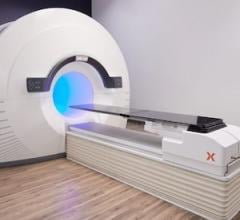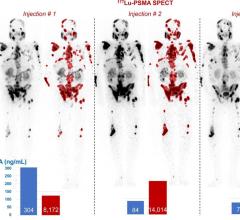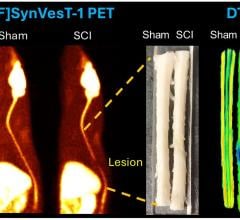
POSLUMA (flotufolastat F 18) PET/CT image showing uptake in the prostate gland, consistent with primary prostate cancer Photo courtesy of Blue Earth Diagnostics
May 30, 2023 — Blue Earth Diagnostics, a Bracco company and recognized leader in the development and commercialization of innovative PET radiopharmaceuticals, today announced U.S. Food and Drug Administration (FDA) approval for its optimized, high-affinity radiohybrid (rh) Prostate-Specific Membrane Antigen (PSMA)-targeted PET imaging agent, POSLUMA (flotufolastat F 18) injection (formerly referred to as 18F-rhPSMA-7.3). POSLUMA is indicated for positron emission tomography (PET) of prostate-specific membrane antigen (PSMA) positive lesions in men with prostate cancer with suspected metastasis who are candidates for initial definitive therapy or with suspected recurrence based on elevated serum prostate-specific antigen (PSA) level. It is the first and only FDA-approved, PSMA-targeted imaging agent developed with proprietary radiohybrid (rh) technology. POSLUMA will be commercially available in early June 2023, through certain radiopharmacies in the national radiopharmacy network of Blue Earth Diagnostics’ commercial U.S. manufacturer and distributor, PETNET Solutions Inc, A Siemens Healthineers Company. It will become increasingly available nationally in coming months.
“With the FDA approval of POSLUMA, we realize our goal of providing an important product that will be widely available across the United States to help inform the management and treatment of patients across the prostate cancer care continuum,” said David E. Gauden, D.Phil., Chief Executive Officer of Blue Earth Diagnostics. “This event marks a major milestone in the expansion of Blue Earth Diagnostics’ robust prostate cancer portfolio. POSLUMA was developed to assist physicians in the detection and localization of prostate cancer. It represents a new class of purposely engineered, high-affinity PSMA-targeted radiopharmaceuticals based on novel radiohybrid technology, which may offer diagnostic imaging and therapeutic potential. All of us at Blue Earth Diagnostics want to express our sincere gratitude to the many patients, physicians, clinical trial sites and collaborators who have worked closely with us to progress POSLUMA.”
POSLUMA is an optimized PSMA-targeted molecule that binds to and is internalized by cells that express PSMA, including prostate cancer cells, which usually overexpress PSMA. It is labeled with the radioisotope fluorine-18 (18F) to enable PET imaging of the prostate and other areas of the body where prostate cancer may have spread. The 18F radioisotope leverages the high image quality of 18F-labeled PSMA PET imaging to facilitate effective detection of disease and enables broad, readily available geographic access for patients.
The approval of POSLUMA is based on data from two Blue Earth Diagnostics-sponsored Phase 3 trials (LIGHTHOUSE and SPOTLIGHT), designed to establish the safety and diagnostic performance of POSLUMA across the continuum of prostate cancer care. Results from the LIGHTHOUSE study demonstrated high specificity for the detection of pelvic lymph nodes as compared to histopathology standard of truth in men with PSMA-positive lesions prior to radical prostatectomy. The SPOTLIGHT study evaluated POSLUMA in men with suspected prostate cancer recurrence based on elevated PSA following prior therapy. Results demonstrated high detection rates (% positive PET scans) even at low PSA levels.
In clinical trials, the safety of POSLUMA was evaluated in 747 patients with initial or recurrent prostate cancer. The adverse reactions reported in ≥0.4% of patients in clinical studies were diarrhea, blood pressure increase and injection site pain.
“Effective staging in newly diagnosed prostate cancer – determining its presence and helping determine whether it may have metastasized − is critical in establishing optimal clinical management strategies, because up to 25% of patients with primary prostate cancer may have detectable regional pelvic lymph node metastases, which are correlated with a risk for recurrence and associated overall survival,” said Brian F. Chapin, MD, Associate Professor, Department of Urology, Division of Surgery, The University of Texas MD Anderson Cancer Center, and Coordinating Investigator of the Phase 3 LIGHTHOUSE study. “Conventional imaging techniques such as CT and MRI are limited in the information they may provide. The LIGHTHOUSE study looked at unfavorable intermediate, high and very high risk patients who were scheduled for radical prostatectomy plus pelvic lymph node dissection (PLND) prior to POSLUMA PET. The study showed that POSLUMA PET provided clinically valuable information prior to surgery that would likely result in management changes for these patients.”
“The highly variable nature of recurrent prostate cancer presents clinical challenges, and up to 40% of patients who undergo radical prostatectomy, and up to 50% of patients who undergo radiation therapy will develop local or distant recurrences within 10 years,” said David M. Schuster, MD, FACR, Emory University School of Medicine, Professor of Radiology and Imaging Sciences at Emory University School of Medicine, a researcher at Winship Cancer Institute of Emory University and Coordinating Investigator for the Phase 3 SPOTLIGHT study. “The ability to determine the extent and location of recurrent disease is necessary to inform physicians and their patients for appropriate clinical management. The Phase 3 SPOTLIGHT study investigated the diagnostic performance of POSLUMA PET imaging as a potential decision-making aid in assessing suspected biochemical recurrence of the disease, and demonstrated that it offered precision diagnostic performance even at low PSA levels with an overall 83% detection rate.”
“We at ZERO Prostate Cancer are thrilled to see the approval of POSLUMA as an additional useful tool for staging prostate cancer,” said Shelby Moneer, MS, CHES, Vice President Advocacy and Patient Support, ZERO Prostate Cancer, a patient advocacy organization. “Determining if, when, or where prostate cancer has returned or spread is of the utmost importance for patients and their medical teams. The more patients know about their own diagnosis, the more empowered they are to seek personalized treatment plans. This new approval will, ultimately, give more options – and hope – to people impacted by prostate cancer.”
About POSLUMA (flotufolastat F 18)
POSLUMA (flotufolastat F 18) injection (formerly referred to as 18F-rhPSMA-7.3) is an optimized, targeted radiohybrid diagnostic imaging agent indicated for positron emission tomography (PET) of prostate-specific membrane antigen (PSMA) positive lesions in men with prostate cancer with suspected metastasis who are candidates for initial therapy or with suspected recurrence based on elevated serum prostate-specific antigen (PSA) level. Precision PET imaging with POSLUMA can help identify the location and extent of prostate cancer, providing clinically valuable information to guide patient management. POSLUMA represents a new class of high-affinity PSMA-targeted PET radiopharmaceuticals based on novel radiohybrid technology and is labeled with the radioisotope 18F to provide readily available patient access and leverage the high image quality of 18F-labeled PSMA PET imaging to facilitate effective detection of disease. POSLUMA was approved by the U.S. Food and Drug Administration in May, 2023.
About Radiohybrid Prostate-Specific Membrane Antigen (rhPSMA)
Radiohybrid Prostate-Specific Membrane Antigen (rhPSMA) compounds consist of a radiohybrid (“rh”) Prostate-Specific Membrane Antigen-targeted receptor ligand which attaches to and is internalized by prostate cancer cells, and they may be radiolabeled with imaging isotopes for PET imaging, or with therapeutic isotopes for therapeutic use – providing the potential for creating a true theranostic technology. Radiohybrid technology and rhPSMA originated from the Technical University of Munich, Germany. Blue Earth Diagnostics acquired exclusive, worldwide rights to rhPSMA diagnostic imaging technology from Scintomics GmbH in 2018, and therapeutic rights in 2020, and sublicensed the therapeutic application to its sister company Blue Earth Therapeutics. Blue Earth Diagnostics received U.S. Food and Drug Administration approval for its radiohybrid PET diagnostic imaging product for use in prostate cancer in 2023. rhPSMA compounds for potential therapeutic use are investigational and have not received regulatory approval.
For more information: www.blueearthdiagnostics.com
Related Content:
Blue Earth Diagnostics Highlights Upcoming Presentation of Additional Results from Investigational Phase 3 LIGHTHOUSE Study
Blue Earth Diagnostics Announces Efficacy and Safety Results from Phase 3 LIGHTHOUSE Trial of Investigational PET Imaging Agent 18F-rhPSMA-7.3 in Newly Diagnosed Prostate Cancer
Blue Earth Diagnostics Announces Results on Clinical Factors Impacting Detection Rates from Phase 3 SPOTLIGHT Trial of Investigational PET Imaging Agent 18F-rhPSMA-7.3 in Biochemical Recurrence of Prostate Cancer
Independent Clinical Studies Published Regarding Performance of Axumin (Fluciclovine F 18) PET Imaging in Patients with Recurrent Prostate Cancer Undergoing Androgen Deprivation Therapy (ADT)
Blue Earth Diagnostics Announces Additional Results from Phase 3 SPOTLIGHT Trial of Investigational PET Imaging Agent 18F-rhPSMA
Blue Earth Diagnostics Announces Key Results from Phase 3 SPOTLIGHT Study of 18F-rhPSMA-7.3
Majority of Recurrent Prostate Cancer Patients' Treatment Plan Changed Following Fluciclovine 18F PET/CT
Blue Earth Diagnostics Announces Dosing of Initial Patient in Phase 3 REVELATE Clinical Trial of 18F-Fluciclovine PET Imaging for Detection of Recurrent Brain Metastases
Blue Earth Diagnostics Highlights Presentations on Axumin (Fluciclovine F 18) and 18F-Fluciclovine at ASTRO21


 January 27, 2026
January 27, 2026 









